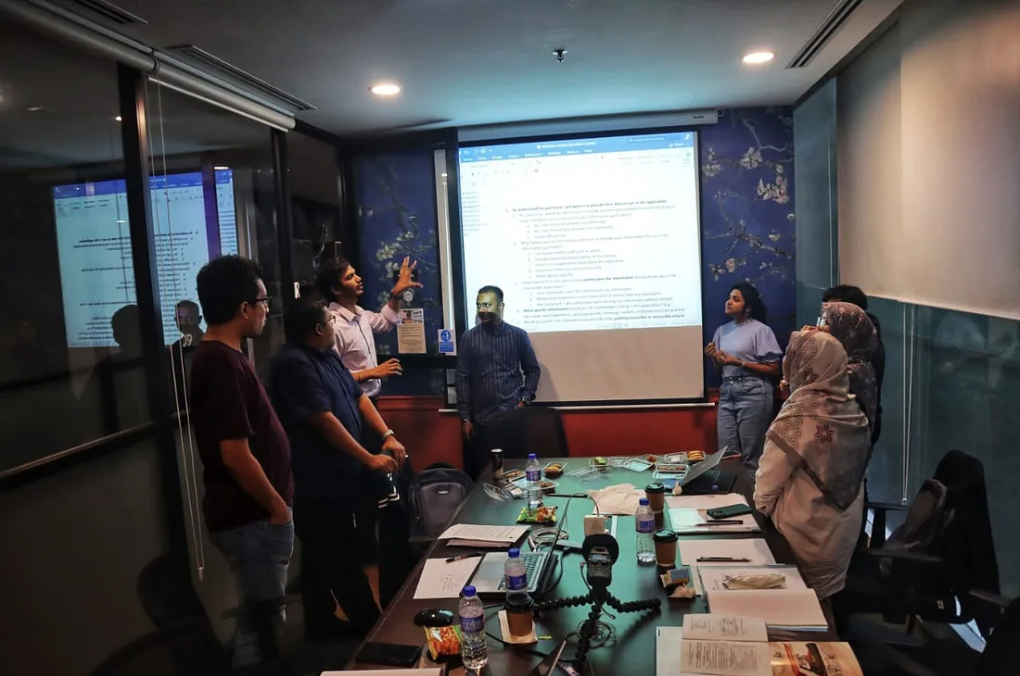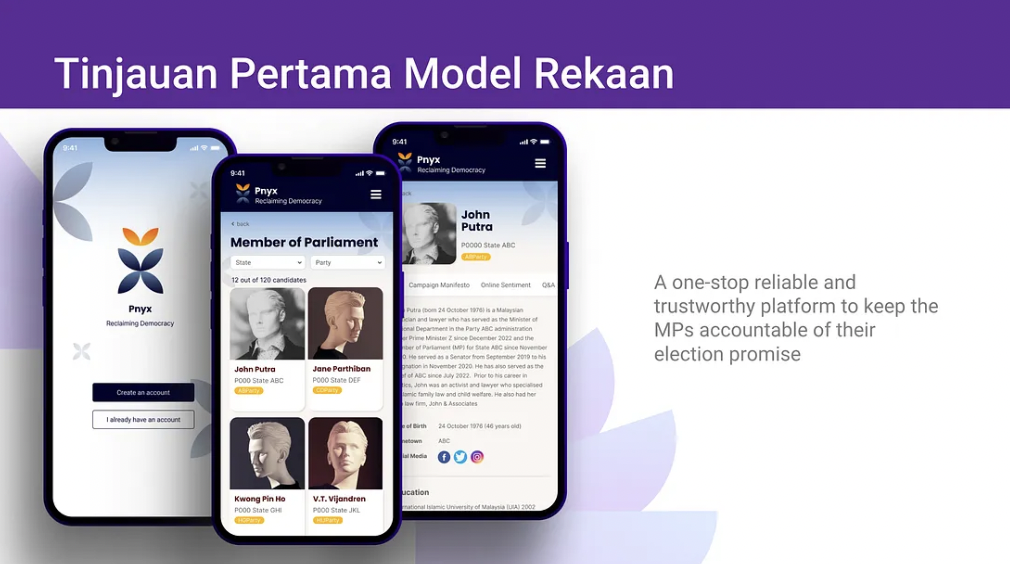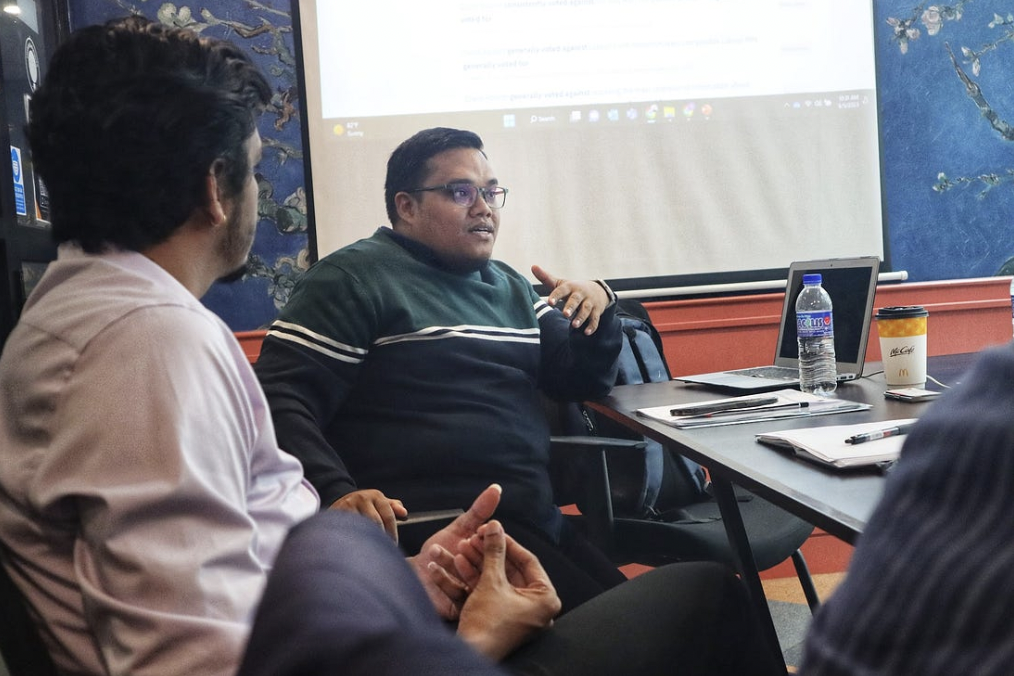Leveraging Technology for Responsible Voting and Accountable Politics: Digitalising the Malaysian Democratic System
A blog by Gopi, Frontier Tech Hub Implementing Partner.
This post introduces learnings from the first sprint of our pilot, Pnyx.
Snapshot of the pilot
The Malaysian political system stands out as a unique model, characterised by a combination of parliamentary democracy and constitutional monarchy. Despite the recent occurrence of the 15th General Election (GE) where Malaysian citizens exercised their right to choose their leaders, there remains a significant information gap in the digitalisation of democracy, hindering voter engagement and perpetuating the status quo.
Our pilot project aims to address this limitation by creating a data-backed digital platform that directly connects voters with Member of Parliaments (MPs) to provide verified information on their capabilities️, ambitions️ monitorable pledges️ and record in office, parliament and their respective constituencies.
By empowering voters with accessible information and direct engagement with MPs, we aim to foster an informed electorate that actively participates in the democratic process. Moreover, access to information can promote accountability among elected MPs, as voters can hold them responsible for their actions. Ultimately, this can contribute to a higher level of integrity within the political system. Our ambition is to enable deep participation in Malaysia’s democratic system.
This project is being delivered with the help from local academic experts from Universiti Putra Malaysia (UPM), Universiti Kebangsaan Malaysia (UKM) and Universiti Pendidikan Sultan Idris (UPSI). The pilot is supported by the Frontier Tech Hub, an initiative funded by UK aid from the Foreign, Commonwealth and Development Office (FCDO).
Leveraging the importance of technology in producing responsible voters and accountable politicians
The digital era has revolutionised various aspects of our lives, and the political landscape is no exception. In Malaysia, efforts have been made to digitise certain aspects of the electoral system and provide information through platforms such as the Malaysian Parliamentary official portal and a mobile application by the Malaysian Election Commission (SPR). However, it is important to note that these platforms primarily serve as updates and information providers, focusing on the current happenings in parliament and offering data on recent and past election statistics.
One crucial area that remains largely untouched is the availability of digitalisation of centralised updates about elected parliament members. Currently, there are no platforms that offer comprehensive and up-to-date information about the activities, initiatives, and performance of individual MPs. This lack of transparency limits the ability of voters to make informed decisions and hold their elected representatives accountable.
Furthermore, there is a significant absence of platforms that facilitate direct communication and interaction between voters and their respective MPs. While the existing platforms provide limited information on candidates and election statistics, they do not offer a means for constituents to engage in meaningful dialogue, express their concerns, or provide feedback to their elected representatives.
To address these gaps, leveraging technology entails building a Minimum Viable Product (MVP) — a basic version of the platform. This involves creating an application that allows voters to gather input on community issues, such as budget allocation or policy proposals, and facilitate discussions using data and digital tools. The app can feature a user-friendly interface for accessing information about elected officials, policy issues, and providing feedback. It can also provide tools for officials and candidates to engage with constituents through forums, polls, and surveys. A data dashboard provides broad perspective (cognitive) and integration with social media platforms enables easy sharing and discussion of policy issues.
By providing a platform for direct engagement between voters and elected MPs, the app increases participation in the democratic process and fosters a sense of ownership. Capturing data on user engagement offers valuable insights into the potential of data and digitalisation in empowering democracy. Mechanisms for verifying data legitimacy ensure trust in the platform’s information.
What we set out and learned in the first sprint
In May 2023, our team embarked on a four-week sprint to delve into the Malaysian political system and gather crucial insights for our pilot project. With the guidance of academic experts in political science, we aimed to gain a comprehensive understanding of the problem and the opportunities ahead. Here’s a breakdown of our key focus areas:
1. Understanding the Malaysian political and electoral system: We began by conducting in-depth research, consulting experts, and analysing available information. Our goal was to grasp the current political landscape, ranging from the overall political situation to the intricacies of the political spectrum. This knowledge formed the foundation of our project.
2. Surveying voters and politicians: To tailor our platform to the needs of both voters and MPs, we designed surveys to gather their valuable input. For voters, we sought to understand their preferences, including the types of information they consider when voting for candidates, their willingness to share personal data for application sign-in, and the perceived importance of such an application. Regarding politicians, our survey focused on gauging their reactions, needs, support, expectations, data-sharing willingness, engagement with voters, and desired features and functionalities for the application.
3. Visualising the project: We believed that visualisation could aid in communicating our concepts effectively and refining our survey. With this in mind, we created low-fidelity mock-ups to represent key moments within the application. These mock-ups helped us construct the survey and solidify our understanding of its scope.
4. Collaborating with internal experts: To ensure the quality and relevance of our survey, we conducted a workshop with our team of internal experts and sought their validation. We also engaged with several politicians, presenting them with preliminary survey questions and holding brainstorming sessions to refine the questionnaire. Their insights were invaluable in shaping the survey to accurately capture the needs and expectations of both voters and politicians. With the guidance and validation from our team of experts, we finalised the survey questions.
5. Identifying potential parliamentary constituencies: In our quest to kickstart the pilot project, we meticulously selected parliamentary constituencies that met specific criteria. Our aim was to ensure a diverse representation of demographics, including both rural and urban constituencies. We also prioritised the composition of MPs, striving for multi-ethnic representation, gender balance, and inclusion of politicians from various political parties. This comprehensive approach ensured that our platform truly catered to the needs of all stakeholders.
By embarking on this journey, we aimed to gather accurate and meaningful data from both voters and politicians, setting the stage for the development of a platform that truly meets their needs. With each experiments in our first sprint, we moved closer to our goal of leveraging technology to create a trustworthy and reliable platform for the Malaysian political landscape.
What we’ve learnt? Findings and Key Learnings?
James Bell and Maura Smyth installing freshly-charged cameras to use in another test
During our first sprint, we gained valuable insights that shaped our understanding of how a centralised information platform can drive positive change in Malaysia’s democratic system. Here’s what we discovered:
Lesson 1: Understanding voter mindsets and election dynamics
One of our most significant findings was the variation in voter thinking patterns across different states. We observed drastic changes in the election of leaders compared to previous elections, indicating a shift in voter preferences and priorities. Notably, the statistics revealed a significant number of spoiled ballots, highlighting the importance of understanding voter mindsets and their engagement with the electoral process. We also recognised the crucial role played by politicians in fulfilling their commitments to their constituencies and national agendas.
Lesson 2: Crafting effective surveys for voters and politicians
Through workshops and discussions with experts, we learned the importance of designing quality surveys to gather valuable input from both voters and politicians. For voters’ survey, clear and directive objectives were key to ensuring a focused survey that avoided redundancy. We also understood the significance of including demographic details, such as gender, marital status, age group, race, religion, education level, employment status, monthly household income, voting experience, and voting details. By collecting this information, we could achieve a comprehensive understanding of the voter population, enabling better analysis and interpretation of survey results.
On the other hand, for politicians’ survey, it was recommended to avoid requesting demographic details as these are readily available through online resources. However, we learned the importance of evaluating survey questions based on the objectives. Streamlining, refining, and merging redundant objectives helped create a concise and effective survey. Additionally, we discovered the value of incorporating general questions before addressing specific objectives. These general questions provided context and insights into voters’ past experiences and their familiarity with any previously engaged applications.
Lesson 3: Leveraging Mock-Ups for Better Understanding
Mock-up of the product
During our sprint, we showcased mock-ups to experts to narrow down the type of solution we aimed to build. Through this process, we clarified that our focus was on developing a web-based product rather than a social media-like platform. The inclusion of these fine-tuned mock-ups as part of the survey administration allowed both voters and politicians to better understand the potential role of the product. This visual assistance facilitated a deeper comprehension of how the platform would benefit and serve the needs of both parties.
Lesson 4: Choosing parliamentary constituencies
We selected 10 constituencies to conduct this project, ensuring support and commitment from all MPs. Our aim was to achieve comprehensive representation for balanced data collection. By including a mix of urban and rural constituencies, parliament members from various political parties, a multiethnic composition, and a gender-balanced representation, the survey aimed to capture a diverse range of perspectives and experiences. This approach recognised the need to consider different geographical, ideological, ethnic, and gender dimensions to gain a comprehensive understanding of political dynamics and preferences in building and developing this App.
By learning these valuable lessons, we gained a deeper understanding of voter mindsets, refined our survey approach, and enhanced our visualisation process. Each of these findings brought us closer to our goal of developing a trustworthy and reliable platform for the Malaysian political landscape.
How this informs our next sprint and what we want to learn next?
In our first sprint, we focused on gathering valuable insights and setting the foundation for our pilot project. As we move forward, there are specific areas that will shape our next sprint and guide our learning objectives.
Getting in touch with politicians to gather their feedback via the survey: By engaging with politicians from different parties and constituencies, we can gather diverse perspectives and understand their expectations, needs, and desired features for the platform. This feedback will be crucial in shaping the development and functionality of the application to meet the requirements of MPs and enhance their engagement with constituents.
Creating and Implementing a Landing Page for the Platform:
To keep everyone informed about the objective and motif of this pilot project, our next sprint will focus on creating and implementing a landing page. This landing page will serve as a central hub for information, providing an overview of the platform and its features. It will also highlight the importance of voter engagement and accountability in the democratic process. By developing a compelling landing page, we aim to generate interest and support for our initiative among the general public, politicians, and other stakeholders.Building Fundamental Infrastructures for the Platform (MVP):
We will lay the groundwork by setting up the necessary technical infrastructure. This includes tasks such as configuring servers, securing a domain, and setting up the database. By completing these technical requirements, we will be prepared for the development of the Minimum Viable Product (MVP). The MVP will be decided during the planning session for Sprint 2, where we will determine the essential features and functionalities that need to be included in the initial version of the platform.
Through these next steps, we aim to advance our understanding and progress towards the successful implementation of our digital platform for responsible voting and accountable politics in Malaysia. By leveraging the insights gained from our panel of experts, creating an informative landing page, and establishing the necessary infrastructure, we will be well-equipped to move forward with the development of the platform in the upcoming sprints.
If you’d like to dig in further…
⛴️ Read about the pilot’s learnings from their second sprint





